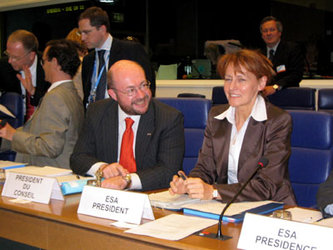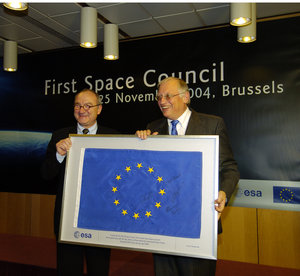Further steps towards a European space policy (2nd Space Council)
ESA PR 29-2005. The second meeting of the Space Council – concomitant meeting of the ESA Council at ministerial level and of the European Union Competitiveness Council (Internal Market/Industry/Research) – was held at the Kiem Conference Centre in Luxembourg today.
In consultation with private and public stakeholders, the Space Council is working on the definition of a coherent space policy and associated programmes, covering the activities of the EU, ESA and their Member States. The objective is to endorse, at the third Space Council meeting planned for November this year, a European space policy and European space programme for the period to 2013.
The orientations for a European space programme are based on the Framework Agreement between the European Community and ESA and on the ESA Convention. At this second meeting, the Space Council confirmed that the European space policy should cover mainly the following:
- a European space strategy,
- a European space programme matching the strategy and reflecting associated costs and funding sources,
- a commitment by the main contributors as to their roles and responsibilities,
- the key principles of implementation.
The aim of the strategy is to develop increasingly advanced space systems according to user needs. All the benefits derived from associated services will have to be shared by all. The EU will have to identify user needs and build a political will around them. ESA and its Member and Cooperating States will develop future space technologies and systems and pursue excellence in space-based scientific research.
Priorities within the European space programme see the EU focusing on space-based applications to contribute to the achievement of its policies, particularly Galileo and the Global Monitoring for Environment and Security programme (GMES). ESA will focus on space exploration and on the basic tools on which the exploitation and exploration of space each depend. Securing guaranteed access to space through a complete, competitive family of launchers, pursuing excellence in space science, and exploiting its know-how in the exploration of the planetary system and in developing technologies to maintain a competitive space sector will be among ESA’s main tasks.
The investments needed for these priorities for the EU, ESA and Member States will be identified in the coming months and go through each organisation's normal budgetary and programmatic approval procedures. By coordinating efforts, the players will ensure that new investments bring additional outcomes. Financing sources for space-related activities for the EU are the Seventh Framework Programme of research, technology and development, the trans-European network programme, and the competitiveness and innovation programme. ESA draws on Member States' contributions to mandatory and optional programmes.
EU space-related programmes will be managed in line with an efficiency criterion, in accordance with the Framework Agreement, and will benefit from ESA's technical and management experience, in cooperation with the relevant agencies and entities in Europe. ESA programmes will be managed in line with its Convention. Decisions on future programmes taken at ESA's ministerial Council meeting in December this year, and discussions on future EU financial prospects, will make it possible to determine whether the programme is consistent with the ambitions of the European space policy.

The second meeting of the Space Council was chaired jointly by Ms Edelgard Bulmahn, German Minister for Education and Research and current Chair of the ESA Council at ministerial level, and Mr François Biltgen, Minister for Labour and Employment, Minister for Culture, Higher Education and Research in Luxembourg, and current Chair of the EU Competitiveness Council. The meeting was also attended by Mr Günter Verheugen, European Commission Vice-President, in charge of enterprise, industry, competitiveness and space matters and by Mr Jean-Jacques Dordain, Director General of the European Space Agency.
German Minister Edelgard Bulmahn said: " Today we are sending an important signal: ESA and EU are moving ahead on their way to put space at the service of the European citizen and the Policies of the EU. Building on the long-standing experience of ESA, the European Space Programme will enable Europe to face the political, economical and scientific challenges of tomorrow."
Luxembourg Minister François Biltgen said: "By agreeing on essential elements of the future European space policy, we have today taken a considerable step forward towards establishing a joint European space programme. Thus, the groundwork has been laid for the third Space Council planned for end-2005 to endorse a European space policy and programme."
Commission Vice-President Günter Verheugen stated : "I am grateful for the full support the Space Council has given the Commission today. We will now work full speed ahead and complete our proposal for a European space policy and programme. This will identify programme priorities for future European development of space applications."

ESA Director General Jean-Jacques Dordain said: "ESA has just turned 30. Thanks to the continuous support of its Member States, it has grown to make the European space sector one of the foremost competitors in the world and at the same time has become a respected partner. Now the European space policy is being integrated within the wider ambitions of Europe and space is set to become a much larger and more integrated undertaking in our future. ESA is prepared to adapt in order to take on an even greater role for Europe."
Background

The Space Council was established in order to coordinate and facilitate cooperative activities between the European Community and ESA through their Framework Agreement, which was adopted in 2003 and entered into force in May 2004.
The first Space Council meeting took place in Brussels on 25 November 2004.
The EC-ESA Framework Agreement has two main aims. The first is the coherent, gradual development of an overall European space policy, which will specifically seek to link demand for services and applications using space systems in support of EU policies with the supply through ESA of space systems and infrastructures necessary to meet that demand. ESA is acting de facto EU implementing agency.
The second aim of the Agreement is to establish a common basis and appropriate practical arrangements for efficient and mutually beneficial cooperation between ESA and the European Community, fully respecting the institutional and operational frameworks of each institution, to facilitate the setting up of joint initiatives and to provide a stable framework for EC-ESA cooperation to benefit all European citizens.
Over the last three years, the EU and ESA have worked together to outline a European space policy that identifies and prioritises objectives for space. The European space programme – expected to be endorsed by a Space Council session at the end of 2005 – will constitute a common platform including all activities and measures to be undertaken by the EC, ESA and other stakeholders in order to achieve the objectives set by the European space policy.
The European space programme will be drawn up in light of the overall recommendations set out in the White Paper on Space, an action plan adopted by the European Commission in November 2003 for implementing an enlarged European space policy. Drafted in cooperation with ESA, the White Paper includes proposals for joint EC-ESA initiatives and takes the Framework Agreement as its basis for implementation.
For further information, please contact:
Barbara Dufner
Spokesperson for Minister Edelgard Bulmahn
Federal Ministry for Education and Research, Berlin
Tel.: +49 1888 57 5175
Pierre Decker
Ministry for Culture, High Education and Research
Research and Innovation Department
Tel. : +352.478.5216
Gregor Kreuzhuber
Spokesman for Commission Vice-President Günter Verheugen
Commissioner for Enterprise and Industry, in charge of competitiveness and space matters
Tel.: + 32 2 296 65 65
Franco Bonacina
Spokesman for ESA Director General Jean-Jacques Dordain
Tel. : + 33 (0)1 53 69 71 55















 Germany
Germany
 Austria
Austria
 Belgium
Belgium
 Denmark
Denmark
 Spain
Spain
 Estonia
Estonia
 Finland
Finland
 France
France
 Greece
Greece
 Hungary
Hungary
 Ireland
Ireland
 Italy
Italy
 Luxembourg
Luxembourg
 Norway
Norway
 The Netherlands
The Netherlands
 Poland
Poland
 Portugal
Portugal
 Czechia
Czechia
 Romania
Romania
 United Kingdom
United Kingdom
 Slovenia
Slovenia
 Sweden
Sweden
 Switzerland
Switzerland


































